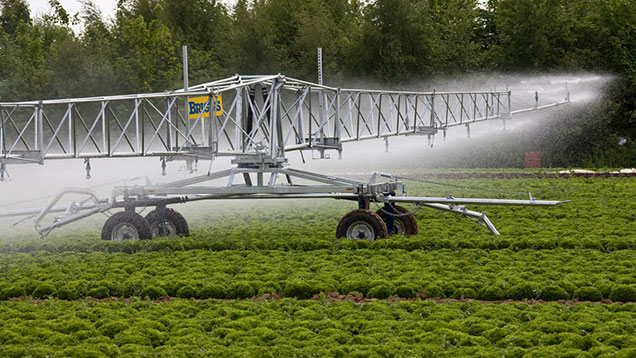Changes to water rules ‘threaten farming’
 © Tim Scrivener
© Tim Scrivener Tighter water abstraction rules threaten to have a profound impact on UK food production, growers have been warned.
Time-limited water abstraction licences due to expire this year and beyond are being assessed by the Environment Agency to ensure they comply with the EU Water Framework Directive (WFD).
See also: Water reform ‘threatens food security’
In some circumstances, licence conditions may change if there is deemed to be a risk of environmental deterioration.
The impact of any changes are most likely to be felt initially in the Cam and Ely Ouse catchment – which encompasses some of the UK’s most productive farmland in East Anglia.
Some 100 farmers and other interested parties gathered to discuss the situation at a UK Irrigation Association conference at the Orton Hall Hotel, Peterborough, on Thursday (5 March).
“These changes could have profound impacts on individual irrigated farming businesses,” said UK Irrigation Association (UKIA) executive secretary Melvyn Kay.
They could affect the nature and composition of irrigated food production – as well as beyond the farm gate in terms of fresh produce supply chains, he added.
“These changes could have profound impacts on individual irrigated farming businesses.”
Melvyn Kay, UKIA executive secretary
“In particular, it raises important questions about how changes in future licensed allocation might impact on growers’ ability to cope with future dry years, how they can maximise productivity and economic output and how best to plan strategically for changes in future water allocation.”
It is estimated that more than 1,000 UK agri-businesses – large and small – depend on irrigation to supply high-quality fresh fruit and vegetables to the nation’s supermarkets.
Irrigated agriculture supports 50,000 food and farming jobs worth about £3bn annually to the UK economy, according to UKIA statistics.
Researchers at Cranfield University are investigating the relationship between groundwater abstraction and any impact on ecology as a basis for decision-making.
The research project, which is being supported by the UKIA, aims to assess water abstraction patterns, locations and river networks in the Cam and Ely Ouse catchment area.
It will also examine the relative timing of maximum irrigation abstraction, maximum soil moisture deficits, minimum groundwater levels, and minimum river flows.
Over the next 10 weeks, researchers also hope to assess the vulnerability of aquatic ecology in the Cam and Ely Ouse to abstraction and other pressures.
